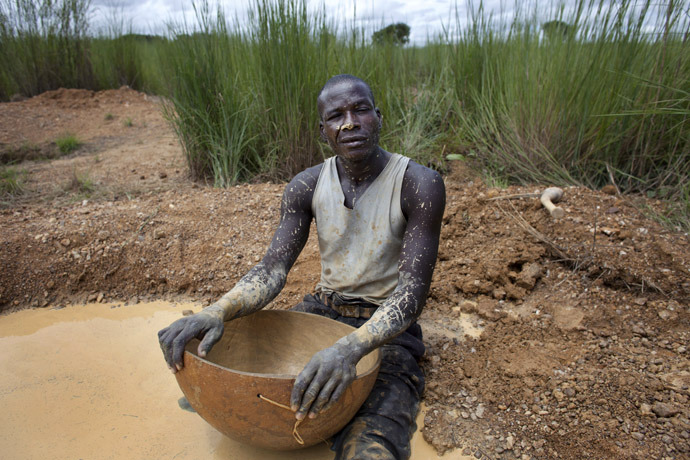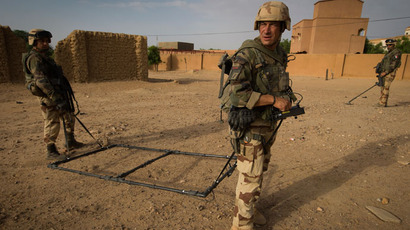Mali gold: Splendors for foreign firms, misery for Malian miners
War-worn Mali has tripled its gold exports over the last decade, though the rising profits are being funneled outside what is one of the world's poorest countries: Foreign corporations appear to be taking over one of Mali’s few thriving industries.
Mali, Africa's third-largest gold producer, has just announced it
expects to double annual gold output over the next five years to
100 tons.
Malian officials claim the gold-abundant south has been untouched
by the military conflict between government troops and Tuareg
insurgents in the north, which prompted an intervention by France
in January. The promise of gold has lured investors into one of
Mali’s most profitable industries.
However, residents have decried the news, as they feel they will
benefit little from the country’s newfound riches. Thousands are
employed as 'traditional miners' in the town of Yanfolila in
southern Mali, the epicenter of the country’s gold rush.
Traditional mining is a near-medieval process in which Malian
workers dig holes approximately the size of their own bodies
using only primitive picks – their gold mines. Without a proper
geological survey, workers are essentially hoping to get lucky.
The narrow shafts go as deep down as 60 meters, the equivalent of
a 15- to 20-story building.
Having gone just several meters down one of those holes, RT’s
Maria Finoshina described the experience as frightening, with the
dark and cramped tunnel having barely any room for movement, and
no support structures to guarantee safety inside. Finoshina said
she could feel oncoming oxygen deprivation after spending just
minutes underground.
The gold miners’ camp is equally barebones, with entire families
helping: After the men extract rocks, women pound, sift and wash
them.

“Having spent here around five hours we are
dirty exhausted and terribly dehydrated. People usually work here
from 10 to 11 hours per day. Every evening they are paid, but not
in cash – they are given rocks taken from the mine. This may
contain gold – if it doesn’t they are just left
empty-handed,” Finoshina
said.
The hours of backbreaking labor usually only yield small grains
of gold, which are then taken to market and sold for a few
dollars a gram. Gold from Mali then travels to Europe and China
to be made into jewelry, leaving no trace of its painful origin.
“I’m not happy as I work more than I get. It’s not for
pleasure – it’s a hard job. And it’s disproportionate,” miner
Adama Tsanal said.
The fact that these miners pay no taxes is little relief, as they
are also exempt from social safety programs.
Malian authorities have announced plans to ban traditional mining
altogether: “The activity reached a huge scale – we lose a
lot. Black market growing. There is no tax system. We don’t have
a penny from it,” Lassana Guindo, president of Mali's
national direction of geology and mines told RT.
Officials appear to favor industrial mining performed with
machinery, which are often referred to as government mines.
Despite the name, these facilities often have major financial
backing from large foreign companies, and only 20 percent of
their revenue is paid into the country’s coffers.
Foreign investment in gold mining in Mali is expected to grow:
This November, a joint Malian-Swiss venture will launch the
country’s first gold refinery. With a monthly capacity of half
the country’s annual production, it will demand a huge increase
in production. At least seven Chinese geological agencies have
already arrived in the country, and many more are likely to
follow.
“Will these others change anything to the better for people?
It’s a big question and that makes me sad,” Broulaye Diallo,
a traditional mine owner said.
Many struggling Malians believe that large foreign corporations
will take over the country's abundant natural resources – wealth
that could otherwise be used to pull Mali out of extreme poverty.
Banning traditional mining also do little to bring stability to
the volatile region. An attempt last year to cut 12,000 jobs at a platinum mine in South Africa
saw the country wracked with violence for several weeks.














